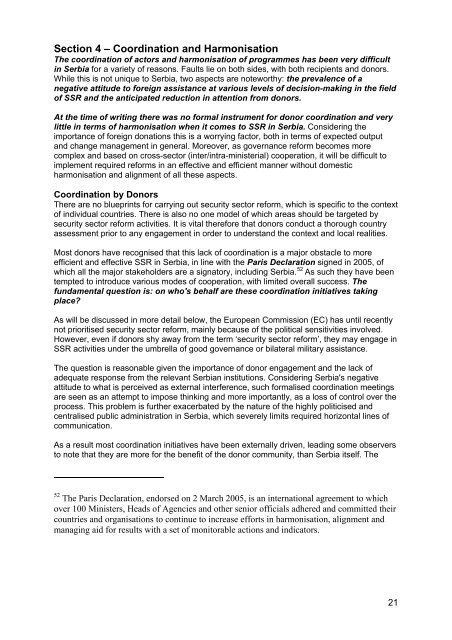Security Sector Reform and Donor Assistance in Serbia - Defence ...
Security Sector Reform and Donor Assistance in Serbia - Defence ...
Security Sector Reform and Donor Assistance in Serbia - Defence ...
Create successful ePaper yourself
Turn your PDF publications into a flip-book with our unique Google optimized e-Paper software.
Section 4 – Coord<strong>in</strong>ation <strong>and</strong> HarmonisationThe coord<strong>in</strong>ation of actors <strong>and</strong> harmonisation of programmes has been very difficult<strong>in</strong> <strong>Serbia</strong> for a variety of reasons. Faults lie on both sides, with both recipients <strong>and</strong> donors.While this is not unique to <strong>Serbia</strong>, two aspects are noteworthy: the prevalence of anegative attitude to foreign assistance at various levels of decision-mak<strong>in</strong>g <strong>in</strong> the fieldof SSR <strong>and</strong> the anticipated reduction <strong>in</strong> attention from donors.At the time of writ<strong>in</strong>g there was no formal <strong>in</strong>strument for donor coord<strong>in</strong>ation <strong>and</strong> verylittle <strong>in</strong> terms of harmonisation when it comes to SSR <strong>in</strong> <strong>Serbia</strong>. Consider<strong>in</strong>g theimportance of foreign donations this is a worry<strong>in</strong>g factor, both <strong>in</strong> terms of expected output<strong>and</strong> change management <strong>in</strong> general. Moreover, as governance reform becomes morecomplex <strong>and</strong> based on cross-sector (<strong>in</strong>ter/<strong>in</strong>tra-m<strong>in</strong>isterial) cooperation, it will be difficult toimplement required reforms <strong>in</strong> an effective <strong>and</strong> efficient manner without domesticharmonisation <strong>and</strong> alignment of all these aspects.Coord<strong>in</strong>ation by <strong>Donor</strong>sThere are no bluepr<strong>in</strong>ts for carry<strong>in</strong>g out security sector reform, which is specific to the contextof <strong>in</strong>dividual countries. There is also no one model of which areas should be targeted bysecurity sector reform activities. It is vital therefore that donors conduct a thorough countryassessment prior to any engagement <strong>in</strong> order to underst<strong>and</strong> the context <strong>and</strong> local realities.Most donors have recognised that this lack of coord<strong>in</strong>ation is a major obstacle to moreefficient <strong>and</strong> effective SSR <strong>in</strong> <strong>Serbia</strong>, <strong>in</strong> l<strong>in</strong>e with the Paris Declaration signed <strong>in</strong> 2005, ofwhich all the major stakeholders are a signatory, <strong>in</strong>clud<strong>in</strong>g <strong>Serbia</strong>. 52 As such they have beentempted to <strong>in</strong>troduce various modes of cooperation, with limited overall success. Thefundamental question is: on who's behalf are these coord<strong>in</strong>ation <strong>in</strong>itiatives tak<strong>in</strong>gplace?As will be discussed <strong>in</strong> more detail below, the European Commission (EC) has until recentlynot prioritised security sector reform, ma<strong>in</strong>ly because of the political sensitivities <strong>in</strong>volved.However, even if donors shy away from the term ‘security sector reform’, they may engage <strong>in</strong>SSR activities under the umbrella of good governance or bilateral military assistance.The question is reasonable given the importance of donor engagement <strong>and</strong> the lack ofadequate response from the relevant <strong>Serbia</strong>n <strong>in</strong>stitutions. Consider<strong>in</strong>g <strong>Serbia</strong>'s negativeattitude to what is perceived as external <strong>in</strong>terference, such formalised coord<strong>in</strong>ation meet<strong>in</strong>gsare seen as an attempt to impose th<strong>in</strong>k<strong>in</strong>g <strong>and</strong> more importantly, as a loss of control over theprocess. This problem is further exacerbated by the nature of the highly politicised <strong>and</strong>centralised public adm<strong>in</strong>istration <strong>in</strong> <strong>Serbia</strong>, which severely limits required horizontal l<strong>in</strong>es ofcommunication.As a result most coord<strong>in</strong>ation <strong>in</strong>itiatives have been externally driven, lead<strong>in</strong>g some observersto note that they are more for the benefit of the donor community, than <strong>Serbia</strong> itself. The52 The Paris Declaration, endorsed on 2 March 2005, is an <strong>in</strong>ternational agreement to whichover 100 M<strong>in</strong>isters, Heads of Agencies <strong>and</strong> other senior officials adhered <strong>and</strong> committed theircountries <strong>and</strong> organisations to cont<strong>in</strong>ue to <strong>in</strong>crease efforts <strong>in</strong> harmonisation, alignment <strong>and</strong>manag<strong>in</strong>g aid for results with a set of monitorable actions <strong>and</strong> <strong>in</strong>dicators.21
















